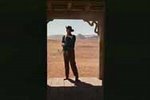
The quote on the cover of Cormac McCarthy's absolutely perfect Blood Meridian, or The Evening Redness in the West describes the book as "A classic American novel of regeneration through violence." Not only does this fever dream of a Western Gothic novel fulfill that promise, it does so with soaring and poetic language that almost seems like it was cut-and-paste ransom-note-style from Moby Dick and The Bible.
The novel depicts the brutal genocide committed against Apaches in the middle of the nineteenth-century by cramming so much lurid, rancid, and visionary prose into its blood-soaked pages that one can hardly tell the Americans from the Indians from the Mexicans. The story’s passive protagonist known simply as "the kid" heads west where he eventually joins the Glanton gang, a group of men who make their living from massacring Apaches and trading their scalps for a bounty along the United States–Mexico borderlands. It is in the company of these killers that the kid encounters Judge Holden, an amalgam of Herman Melville’s Ahab, Fyodor Dostoyvsky’s Grand Inquisitor, and Goethe's Mephistopheles. Soon, the Glanton gang begins harvesting and selling the scalps of nonthreatening Indians, unprotected Mexican villages, or anyone else who crosses their path. The solipsistic gang devolves, sweeping through the expansive and inhospitable desert borderland like destructive angels from the Old Testament, purifying the land with blood and fire in preparation for its sacrifice at the hands of America's endless imperial expansionism.
Some have described this frenzied novel as awash in extreme violence, a religious or existential allegory, or a re-revisionist Western that savagely explodes Manifest Destiny. Maybe McCarthy is expressing all these impassioned sentiments. But the Blood Meridian's biggest coup is its implicit critique of America's oppressive capitalist system. Violence becomes a commodity. Judge Holden explains to the kid and audience alike the fundamental economics of trading human scalps (i.e., lives) for money: "War endures. You may as well ask man what he thinks of stone. Before man was, war waited for him – the ultimate trade, awaiting the ultimate practitioner." Holden later states, "Everything is for sale."
John Sepich's hard-to-find Notes on Blood Meridian examines the dense novel's historical and mystical references. The Glanton Gang and their bloody escapades have historical roots in three primary sources: Samuel Chamberlain's memoirs, My Confessions: Recollections of a Rogue, gathered together as a manuscript in 1905 and published in book form in 1956; Audubon's Western Journal 1849-1850, (1906) by John Woodhouse Audubon, son of noted naturalist John James Audubon; and Mayne Reid's The Scalphunters (c. 1851). McCarthy faithfully casts this historically accurate nightmare into a bold narrative that reveals America's westward expansion to be rotten at it's core.
The novel could be considered an "acid western" because of it's hallucinogenic representation of events. It is also fits into the subgenre because Blood Meridian offers a a critique of capitalism as being unavoidably linked to war and violence, but McCarthy is wary of alternatives models. In the only interview that McCarthy has granted to date, he told the New York Times in 1992, “There's no such thing as life without bloodshed. I think the notion that the species can be improved in some way, that everyone could live in harmony, is a really dangerous idea. Those who are afflicted with this notion are the first ones to give up their souls, their freedom. Your desire that it be that way will enslave you and make your life vacuous.”
Blood Meridian was recently hailed by the New York Times as one of the best American novels of the past 25 years. Critic Steven Shaviro notes, "the scariest thing about Blood Meridian is that it is a euphoric and exhilarating book, rather than a tragically alienated one." Critic Harold Bloom praised the novel as "clearly the major esthetic achievement of any living writer." This ultimate Western is fathomlessly violent, poetic, and strangely entertaining.
